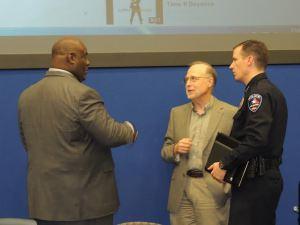
Nobody is excited by Republican Lite (especially Republicans)
By Alan Bean
Texas Democrats are confused. For generations we were the party of Dixiecrat populists; defending the interests of the little guy from corporate elites, while beating the drum for white supremacy. But when the Democratic Party became associated with civil rights, Texas politics shifted from Blue to Red. A handful of urban districts remained dependably Blue, but the suburbs, small towns and rural sections of the Lone Star State are decidedly, triumphantly, Republican.
As a consequence, the Texas Democratic Party now consists of educated white liberals, African Americans, Latinos, and an aging cadre of white “Yeller-dogs” longing for the return of Dixiecrat hegemony.
Texas Democrats have identity issues. We all want to “turn Texas blue”, but that’s where the agreement ends. In the interest of party unity, we kick the vision question down the road, defining ourselves negatively, in terms of what we aren’t.
Specifically, we aren’t Tea Party conservatives.
That ain’t good enough.
There are two conflicting strategies for turning Texas Blue: we can get out the minority vote; or we can persuade moderate Republicans to abandon a party dominated by Tea Party extremists. But we can’t pursue both strategies at the same time without garbling our message and blurring our vision. Here’s why.
Democrats lament the traditionally low voter turnout in Texas, particularly in the Latino community; but there are good reasons why so many Black and Latino Texans stay home on election day. With the exception of a handful of overwhelmingly Latino districts, electoral politics in Texas is controlled by the white majority. When African Americans and Latinos believe that their interests, passions and values will be taken into consideration, they will show up at the polls. We have taken the Black and Latino vote for granted, and it shows.
The twin goals of engaging minority voters and reaching out to disaffected Republicans can only work together, but only if Texas Democrats embrace a vision that makes sense to both groups.
Superficially, minority voters and moderate Republicans have a lot in common. Issues like gay rights and abortion aren’t priorities with either group, so an argument could be made for Democrats pushing these issues to the back burner.
But a party of genuine inclusion can’t do that. Gay and lesbian Texans cannot be ignored; nor can women. We need an inclusive vision that applies the logic of civil rights to the full range of political issues.
While moderate Republicans and minority voters share a tradition of social conservatism, the tragic racial history of America divides them.

Alan Bean (center) in conversation with Rev. Dwight McKissic (Left) and Arlington Police Chief, Will Johnson.
The other night I participated in a panel discussion in Arlington, Texas sponsored by the NAACP. The topic was Ferguson, Missouri and the question was whether a similar tragedy could happen in our community.
I kept hearing the same comment from the speakers’ table and the floor: “We’ve got to focus on the historical legacy behind these events.”
I decided to address the elephant in the room. “I spend a lot of time in both white, Latino and African American circles,” I said, “and I have noticed something: Black and Latino Americans want to talk about history–they need to talk about history. And when I say ‘history’ I’m not just talking about the stellar men and women from minority communities who have accomplished great things; I’m talking about slavery; I’m talking about lynching; I’m talking about the daily humiliation of Jim Crow segregation; and I’m talking about mass incarceration. Minority Americans want to talk about these things, but they scare white people half to death. We would rather have a root canal than talk about racial history.”
The room erupted in applause.
When I share my “history lecture” with white audiences, I get stony silence.
And here’s the thing: until America is ready to sift through the sordid details of our shared racial history, particularly as it applies to Native Americans, African Americans and Latinos, that national conversation on race that Bill Clinton talked about years ago will be eternally postponed.
Texas Democrats can’t take Black and Latino voters seriously while ignoring the implications of America’s racial history. On the other hand, if we place the challenges of the present in proper historical context, we will have moderate Republicans (and most white Democrats) fleeing into the night.
That’s the dilemma.
Electoral politics is a lot like church life: to keep everybody happy, some subjects must never be engaged in public. But so long as Texas Democrats ignore racial history, we can’t attract either white moderates or disaffected minorities.
An inclusive political vision begins with the frank admission that American politics has patronized or ignored just about everybody: poor people, racial, ethnic and religious minorities, women, and the LGBT community.
Next, we’ve got to build a genuinely inclusive political movement that embraces the valid concerns of all Americans (including, by the way, the corporate and entrepreneurial communities–they too have legitimate concerns).
To do that, we must create a renewed vision of the common good. We can no longer cede public morality to the Christian Right. If liberals are the folks who smirk at the very notion of a shared public morality, we must eschew liberalism; or we can invest the word “liberal” with real moral significance. I can go either way.
Above all, we need a politics that spells out the meaning of “liberty and justice for all.” This isn’t just about leaving everybody free to make up their own rules; we need a moral foundation that works for everybody. America lacks a shared moral vision, which is precisely why the Tea Party and the Christian Right have been so successful. People want to know what we stand for as a nation, and liberals have little to offer in that regard.
It isn’t enough, therefore, to disagree with the Tea Party and the Christian Right–that’s like shooting fish in a barrel. So long as radical conservatives are the only people with a moral vision, they will prosper.
A few preliminary affirmations:
- We can no longer privilege Protestant Christianity; but we must celebrate the diverse communities of faith that infuse our national life with hope and moral vision.
- We must transcend the kind of identity politics that gives us leaders who can defend the interests of their own community but are tone deaf to the legitimate demands of concerns everyone else.
- We must show appreciation for the business community and the entrepreneurial spirits among us, while standing in stout solidarity with the poor and with the working men and women of America.
I could elaborate, but you catch my drift.
That’s what a genuinely inclusive political vision looks like.
Suppose Texas turned Blue tomorrow; what would change? What, beyond muting the agenda of the radical Right, would we bring to the table?
Nobody, including most Republicans, is excited about Republican Lite. Short-term political strategy may militate against a carefully articulated agenda; but neither party can thrive in the long-run without moral clarity.
There is a tent big enough to hold us all, but it won’t build itself.
